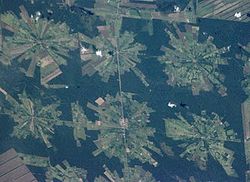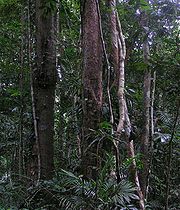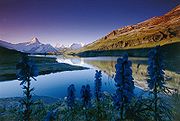
Conservation ethic
Encyclopedia


Natural environment
The natural environment encompasses all living and non-living things occurring naturally on Earth or some region thereof. It is an environment that encompasses the interaction of all living species....
: its, fisheries
Fishery
Generally, a fishery is an entity engaged in raising or harvesting fish which is determined by some authority to be a fishery. According to the FAO, a fishery is typically defined in terms of the "people involved, species or type of fish, area of water or seabed, method of fishing, class of boats,...
, habitats
Habitat (ecology)
A habitat is an ecological or environmental area that is inhabited by a particular species of animal, plant or other type of organism...
, and biological diversity. Secondary focus is on materials conservation and energy conservation
Energy conservation
Energy conservation refers to efforts made to reduce energy consumption. Energy conservation can be achieved through increased efficient energy use, in conjunction with decreased energy consumption and/or reduced consumption from conventional energy sources...
, which are seen as important to protect the natural world. Those who follow the conservation ethic and, especially, those who advocate or work toward conservation goals are termed conservationist
Conservationist
Conservationists are proponents or advocates of conservation. They advocate for the protection of all the species in an ecosystem with a strong focus on the natural environment...
s.
Introduction
To conserve habitatHabitat conservation
Habitat conservation is a land management practice that seeks to conserve, protect and restore, habitat areas for wild plants and animals, especially conservation reliant species, and prevent their extinction, fragmentation or reduction in range...
in terrestrial ecoregions and stop deforestation
Deforestation
Deforestation is the removal of a forest or stand of trees where the land is thereafter converted to a nonforest use. Examples of deforestation include conversion of forestland to farms, ranches, or urban use....
is a goal widely shared by many groups with a wide variety of motivations.
To protect sea life from extinction
Extinction
In biology and ecology, extinction is the end of an organism or of a group of organisms , normally a species. The moment of extinction is generally considered to be the death of the last individual of the species, although the capacity to breed and recover may have been lost before this point...
due to overfishing
Overfishing
Overfishing occurs when fishing activities reduce fish stocks below an acceptable level. This can occur in any body of water from a pond to the oceans....
is another commonly stated goal of conservation — ensuring that "some will be available for our children" to continue a way of life.
The consumer conservation ethic is sometimes expressed by the four R's: " Rethink, Reduce, Recycle, Repair"
This social ethic primarily relates to local purchasing
Local purchasing
Local purchasing is a preference to buy locally produced goods and services over those produced more distantly. It is very often abbreviated as a positive goal 'buy local' to parallel the phrase think globally, act locally common in green politics....
, moral purchasing, the sustained
Sustainability
Sustainability is the capacity to endure. For humans, sustainability is the long-term maintenance of well being, which has environmental, economic, and social dimensions, and encompasses the concept of union, an interdependent relationship and mutual responsible position with all living and non...
, and efficient use of renewable resource
Renewable resource
A renewable resource is a natural resource with the ability of being replaced through biological or other natural processes and replenished with the passage of time...
s, the moderation of destructive use of finite resources, and the prevention of harm to common resources such as air
Air pollution
Air pollution is the introduction of chemicals, particulate matter, or biological materials that cause harm or discomfort to humans or other living organisms, or cause damage to the natural environment or built environment, into the atmosphere....
and water
Water pollution
Water pollution is the contamination of water bodies . Water pollution occurs when pollutants are discharged directly or indirectly into water bodies without adequate treatment to remove harmful compounds....
quality, the natural functions of a living earth, and cultural values in a built environment
Built environment
The term built environment refers to the human-made surroundings that provide the setting for human activity, ranging in scale from personal shelter and buildings to neighborhoods and cities that can often include their supporting infrastructure, such as water supply or energy networks.The built...
.
The principal value underlying most expressions of the conservation ethic is that the natural world has intrinsic and intangible worth along with utilitarian value — a view carried forward by the scientific conservation movement
Conservation movement
The conservation movement, also known as nature conservation, is a political, environmental and a social movement that seeks to protect natural resources including animal, fungus and plant species as well as their habitat for the future....
and some of the older Romantic
Romanticism
Romanticism was an artistic, literary and intellectual movement that originated in the second half of the 18th century in Europe, and gained strength in reaction to the Industrial Revolution...
schools of ecology movement
Ecology movement
The global ecology movement is based upon environmental protection, and is one of several new social movements that emerged at the end of the 1960s. As a values-driven social movement, it should be distinguished from the pre-existing science of ecology....
.
More Utilitarian schools of conservation seek a proper valuation of local and global impacts of human activity upon nature in their effect upon human well being, now and to our posterity. How such values are assessed and exchanged among people determines the social, political, and personal restraints and imperatives by which conservation is practiced. This is a view common in the modern environmental movement
Environmental movement
The environmental movement, a term that includes the conservation and green politics, is a diverse scientific, social, and political movement for addressing environmental issues....
.
These movements have diverged but they have deep and common roots in the conservation movement
Conservation movement
The conservation movement, also known as nature conservation, is a political, environmental and a social movement that seeks to protect natural resources including animal, fungus and plant species as well as their habitat for the future....
.
In the United States of America
United States
The United States of America is a federal constitutional republic comprising fifty states and a federal district...
, the year 1864 saw the publication of two books which laid the foundation for Romantic and Utilitarian conservation traditions in America. The posthumous publication of Henry David Thoreau
Henry David Thoreau
Henry David Thoreau was an American author, poet, philosopher, abolitionist, naturalist, tax resister, development critic, surveyor, historian, and leading transcendentalist...
's Walden
Walden
Walden is an American book written by noted Transcendentalist Henry David Thoreau...
established the grandeur of unspoiled nature as a citadel to nourish the spirit of man. From George Perkins Marsh
George Perkins Marsh
George Perkins Marsh , an American diplomat and philologist, is considered by some to be America's first environmentalist, although "conservationist" would be more accurate...
a very different book, Man and Nature
Man and Nature
Man and nature; or, Physical geography as modified by human action is a book written by George Perkins Marsh in 1864.It is one of the first works to document the effects of human action on the environment and it helped to launch the modern conservation movement. Marsh argued that ancient...
, later subtitled "The Earth as Modified by Human Action", catalogued his observations of man exhausting and altering the land from which his sustenance derives.
Terminology
In common usage, the term refers to the activity of systematically protecting natural resources such as forests, including biological diversityBiodiversity
Biodiversity is the degree of variation of life forms within a given ecosystem, biome, or an entire planet. Biodiversity is a measure of the health of ecosystems. Biodiversity is in part a function of climate. In terrestrial habitats, tropical regions are typically rich whereas polar regions...
. Carl F. Jordan defines the term as:
While this usage is not new, the idea of biological conservation has been applied to the principles of ecology
Ecology
Ecology is the scientific study of the relations that living organisms have with respect to each other and their natural environment. Variables of interest to ecologists include the composition, distribution, amount , number, and changing states of organisms within and among ecosystems...
, biogeography
Biogeography
Biogeography is the study of the distribution of species , organisms, and ecosystems in space and through geological time. Organisms and biological communities vary in a highly regular fashion along geographic gradients of latitude, elevation, isolation and habitat area...
, anthropology
Anthropology
Anthropology is the study of humanity. It has origins in the humanities, the natural sciences, and the social sciences. The term "anthropology" is from the Greek anthrōpos , "man", understood to mean mankind or humanity, and -logia , "discourse" or "study", and was first used in 1501 by German...
, economy
Economics
Economics is the social science that analyzes the production, distribution, and consumption of goods and services. The term economics comes from the Ancient Greek from + , hence "rules of the house"...
and sociology
Sociology
Sociology is the study of society. It is a social science—a term with which it is sometimes synonymous—which uses various methods of empirical investigation and critical analysis to develop a body of knowledge about human social activity...
to maintain biodiversity
Biodiversity
Biodiversity is the degree of variation of life forms within a given ecosystem, biome, or an entire planet. Biodiversity is a measure of the health of ecosystems. Biodiversity is in part a function of climate. In terrestrial habitats, tropical regions are typically rich whereas polar regions...
.
The term "conservation" itself may cover the concepts such as cultural diversity
Cultural diversity
Cultural diversity is having different cultures respect each other's differences. It could also mean the variety of human societies or cultures in a specific region, or in the world as a whole...
, genetic diversity
Genetic diversity
Genetic diversity, the level of biodiversity, refers to the total number of genetic characteristics in the genetic makeup of a species. It is distinguished from genetic variability, which describes the tendency of genetic characteristics to vary....
and the concept of movements environmental conservation, seedbank
Seedbank
A seedbank stores seeds as a source for planting in case seed reserves elsewhere are destroyed. It is a type of gene bank. The seeds stored may be food crops, or those of rare species to protect biodiversity. The reasons for storing seeds may be varied...
(preservation of seeds). These are often summarized as the priority to respect diversity
Respect diversity
The prerogative to respect diversity, often said to "begin with biodiversity" of non-human life, is basic to some 20th century studies such as cultural ecology, Queer studies, and anthropological linguistics....
, especially by Greens
Green Movement
The Green Movement refers to a series of actions after the 2009 Iranian presidential election, in which protesters demanded the removal of Mahmoud Ahmadinejad from office...
.
Much recent movement in conservation can be considered a resistance to commercialism
Commercialism
Commercialism, in its original meaning, is the practices, methods, aims, and spirit of commerce or business. Today, however, it primarily refers to the tendency within open-market capitalism to turn everything into objects, images, and services sold for the purpose of generating profit...
and globalization
Globalization
Globalization refers to the increasingly global relationships of culture, people and economic activity. Most often, it refers to economics: the global distribution of the production of goods and services, through reduction of barriers to international trade such as tariffs, export fees, and import...
. Slow food
Slow Food
Slow Food is an international movement founded by Carlo Petrini in 1986. Promoted as an alternative to fast food, it strives to preserve traditional and regional cuisine and encourages farming of plants, seeds and livestock characteristic of the local ecosystem. It was the first established part of...
is a consequence of rejecting these as moral priorities, and embracing a slower and more locally focused lifestyle.
Practice

Species
In biology, a species is one of the basic units of biological classification and a taxonomic rank. A species is often defined as a group of organisms capable of interbreeding and producing fertile offspring. While in many cases this definition is adequate, more precise or differing measures are...
and their habitats have been government-led, those in the North Western Europe tended to arise out of the middle-class and aristocratic interest in natural history
Natural history
Natural history is the scientific research of plants or animals, leaning more towards observational rather than experimental methods of study, and encompasses more research published in magazines than in academic journals. Grouped among the natural sciences, natural history is the systematic study...
, expressed at the level of the individual and the national, regional or local learned society
Learned society
A learned society is an organization that exists to promote an academic discipline/profession, as well a group of disciplines. Membership may be open to all, may require possession of some qualification, or may be an honor conferred by election, as is the case with the oldest learned societies,...
. Thus countries like Britain, the Netherlands, Germany, etc. had what we would today term NGOs — in the shape of the RSPB, National Trust
National Trust for Places of Historic Interest or Natural Beauty
The National Trust for Places of Historic Interest or Natural Beauty, usually known as the National Trust, is a conservation organisation in England, Wales and Northern Ireland...
and County Naturalists' Trusts (dating back to 1889, 1895 and 1912 respectively) Natuurmonumenten, Provincial conservation Trusts for each Dutch province, Vogelbescherming, etc. — a long time before there were National Parks and National Nature Reserves. This in part reflects the absence of wilderness areas in heavily cultivated Europe, as well as a longstanding interest in laissez-faire
Laissez-faire
In economics, laissez-faire describes an environment in which transactions between private parties are free from state intervention, including restrictive regulations, taxes, tariffs and enforced monopolies....
government in some countries, like the UK, leaving it as no coincidence that John Muir
John Muir
John Muir was a Scottish-born American naturalist, author, and early advocate of preservation of wilderness in the United States. His letters, essays, and books telling of his adventures in nature, especially in the Sierra Nevada mountains of California, have been read by millions...
, the British-born founder of the National Park movement (and hence of government-sponsored conservation) did his sterling work in the USA, where he was the motor force behind the establishment of such NPs as Yosemite and Yellowstone. Nowadays, officially more than 10 percent of the world is legally protected in some way or the other, and in practice private fundraising is insufficient to pay for the effective management of so much land with protective status.

Chichen Itza
Chichen Itza is a large pre-Columbian archaeological site built by the Maya civilization located in the northern center of the Yucatán Peninsula, in the Municipality of Tinúm, Yucatán state, present-day Mexico....
, Yucatán
Yucatán
Yucatán officially Estado Libre y Soberano de Yucatán is one of the 31 states which, with the Federal District, comprise the 32 Federal Entities of Mexico. It is divided in 106 municipalities and its capital city is Mérida....
. The Adopt A Ranger Foundation has calculated that worldwide about 140,000 rangers are needed for the protected areas in developing and transition countries. There are no data on how many rangers are employed at the moment, but probably less than half the protected areas in developing and transition countries have any rangers at all and those that have them are at least 50% short This means that there would be a worldwide ranger deficit of 105,000 rangers in the developing and transition countries.
One of the world's foremost conservationists, Dr. Kenton Miller, stated about the importance of rangers: "The future of our ecosystem services and our heritage depends upon park rangers. With the rapidity at which the challenges to protected areas are both changing and increasing, there has never been more of a need for well prepared human capacity to manage. Park rangers are the backbone of park management. They are on the ground. They work on the front line with scientists, visitors, and members of local communities."
Adopt A Ranger, fears that the ranger deficit is the greatest single limiting factor in effectively conserving nature in 75% of the world. Currently, no conservation organization or western country or international organization addresses this problem. Adopt A Ranger has been incorporated to draw worldwide public attention to the most urgent problem that conservation is facing in developing and transition countries: protected areas without field staff. Very specifically, it will contribute to solving the problem by fund raising to finance rangers in the field. It will also help governments in developing and transition countries to assess realistic staffing needs and staffing strategies
See also
- Conservation biologyConservation biologyConservation biology is the scientific study of the nature and status of Earth's biodiversity with the aim of protecting species, their habitats, and ecosystems from excessive rates of extinction...
- Conservation movementConservation movementThe conservation movement, also known as nature conservation, is a political, environmental and a social movement that seeks to protect natural resources including animal, fungus and plant species as well as their habitat for the future....
- EcologyEcologyEcology is the scientific study of the relations that living organisms have with respect to each other and their natural environment. Variables of interest to ecologists include the composition, distribution, amount , number, and changing states of organisms within and among ecosystems...
- EnvironmentalismEnvironmentalismEnvironmentalism is a broad philosophy, ideology and social movement regarding concerns for environmental conservation and improvement of the health of the environment, particularly as the measure for this health seeks to incorporate the concerns of non-human elements...
- Environmental protectionEnvironmental protectionEnvironmental protection is a practice of protecting the environment, on individual, organizational or governmental level, for the benefit of the natural environment and humans. Due to the pressures of population and our technology the biophysical environment is being degraded, sometimes permanently...
- Habitat conservationHabitat conservationHabitat conservation is a land management practice that seeks to conserve, protect and restore, habitat areas for wild plants and animals, especially conservation reliant species, and prevent their extinction, fragmentation or reduction in range...
- List of conservation issues
- List of environmental issues
- List of environmental organizations
- List of environmental topics
- Natural environmentNatural environmentThe natural environment encompasses all living and non-living things occurring naturally on Earth or some region thereof. It is an environment that encompasses the interaction of all living species....
- Natural capitalNatural capitalNatural capital is the extension of the economic notion of capital to goods and services relating to the natural environment. Natural capital is thus the stock of natural ecosystems that yields a flow of valuable ecosystem goods or services into the future...
- Natural resourceNatural resourceNatural resources occur naturally within environments that exist relatively undisturbed by mankind, in a natural form. A natural resource is often characterized by amounts of biodiversity and geodiversity existent in various ecosystems....
- Renewable resourceRenewable resourceA renewable resource is a natural resource with the ability of being replaced through biological or other natural processes and replenished with the passage of time...
- SustainabilitySustainabilitySustainability is the capacity to endure. For humans, sustainability is the long-term maintenance of well being, which has environmental, economic, and social dimensions, and encompasses the concept of union, an interdependent relationship and mutual responsible position with all living and non...
- Sustainable agricultureSustainable agricultureSustainable agriculture is the practice of farming using principles of ecology, the study of relationships between organisms and their environment...
- Water conservationWater conservationWater conservation refers to reducing the usage of water and recycling of waste water for different purposes such as cleaning, manufacturing, and agricultural irrigation.- Water conservation :Water conservation can be defined as:...
Further reading
- Conservation and evolution (Frankel et Soulé, 1981)
- Glacken, C.J. (1967) Traces on the Rhodian Shore. University of California Press. Berkeley
- Grove, R.H. (1992) 'Origins of Western Environmentalism', Scientific American 267(1): 22-27.
- Grove, R.H. (1997) Ecology, Climate and Empire: Colonialism and Global Environmental History 1400-1940 Cambridge: Whitehorse Press
- Grove, R.H. (1995) Green Imperialism: Colonial Expansion, Tropical Island Edens, and the Origins of Environmentalism, 1600-1860 New York: Cambridge University Press
- Leopold, A. (1966) A Sand County Almanac New York: Oxford University PressOxford University PressOxford University Press is the largest university press in the world. It is a department of the University of Oxford and is governed by a group of 15 academics appointed by the Vice-Chancellor known as the Delegates of the Press. They are headed by the Secretary to the Delegates, who serves as...
- Pinchot, G. (1910) The Fight for Conservation New York: Harcourt Brace.
- "Why Care for Earth's Environment?" (in the series "The Bible's Viewpoint") is a two-page article in the December 2007 issue of the magazine Awake!Awake!Awake! is a monthly illustrated magazine published by Jehovah's Witnesses via the Watch Tower Bible and Tract Society of Pennsylvania and printed in various branch offices around the world. It is considered to be a companion magazine of The Watchtower, and is distributed by Jehovah's Witnesses in...
.
External links
- Dictionary of the History of ideas: Conservation of Natural Resources
- For Future Generations, a Canadian documentary on how the conservation ethic influenced national parks
- Category List --- Religion-Online.org "Ecology/Environment"

